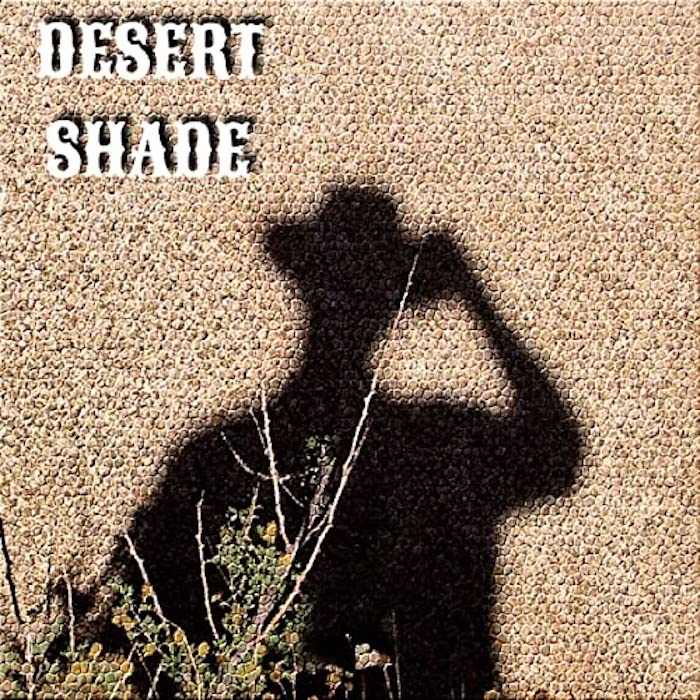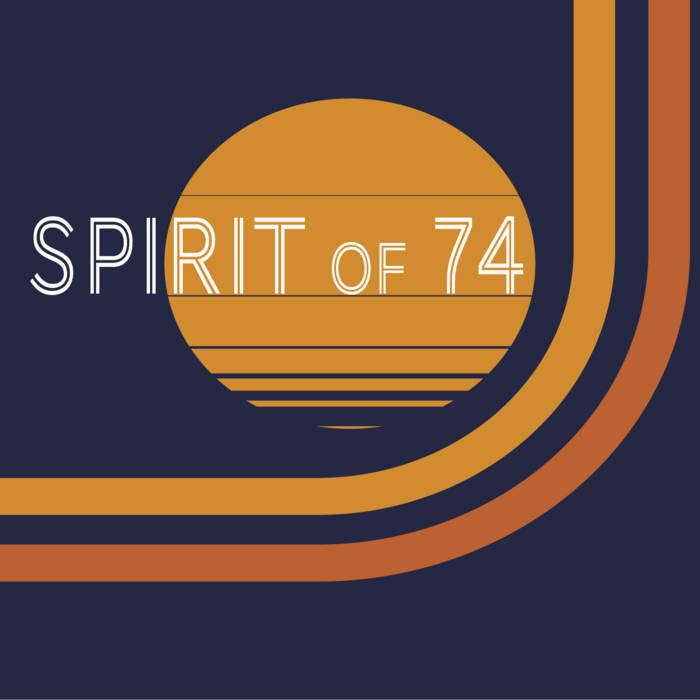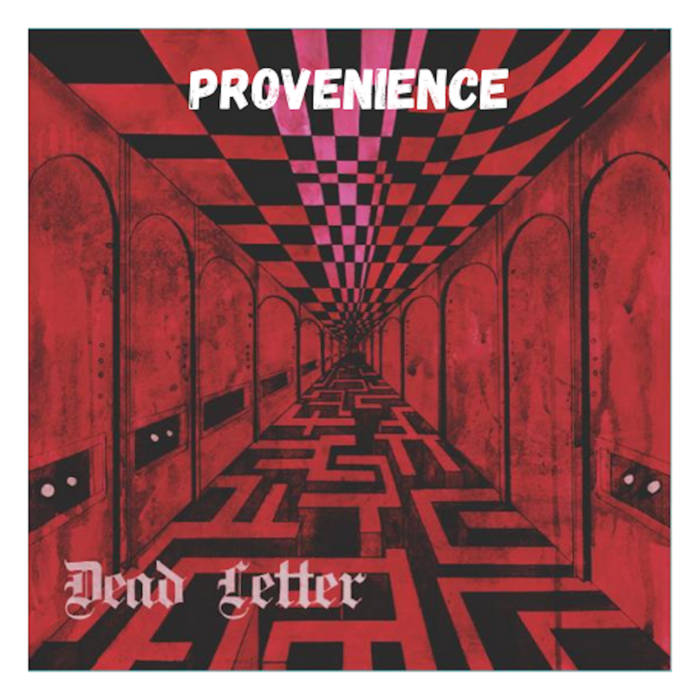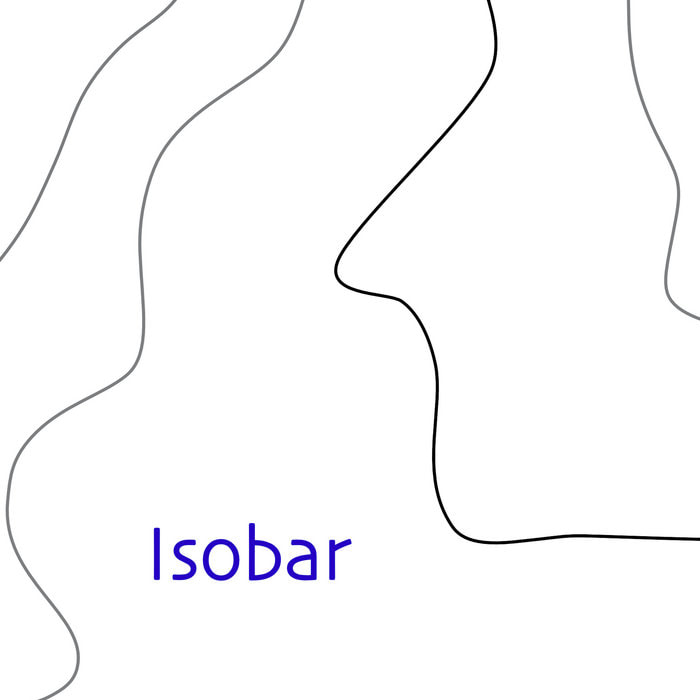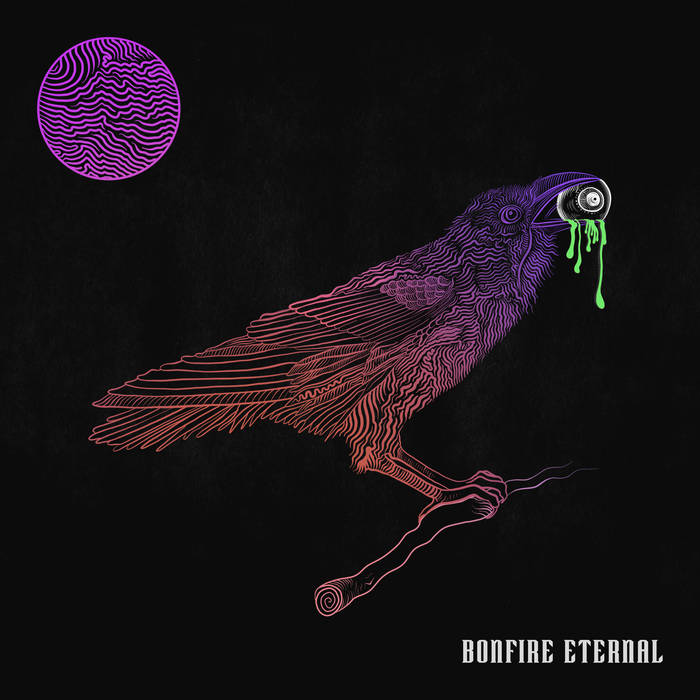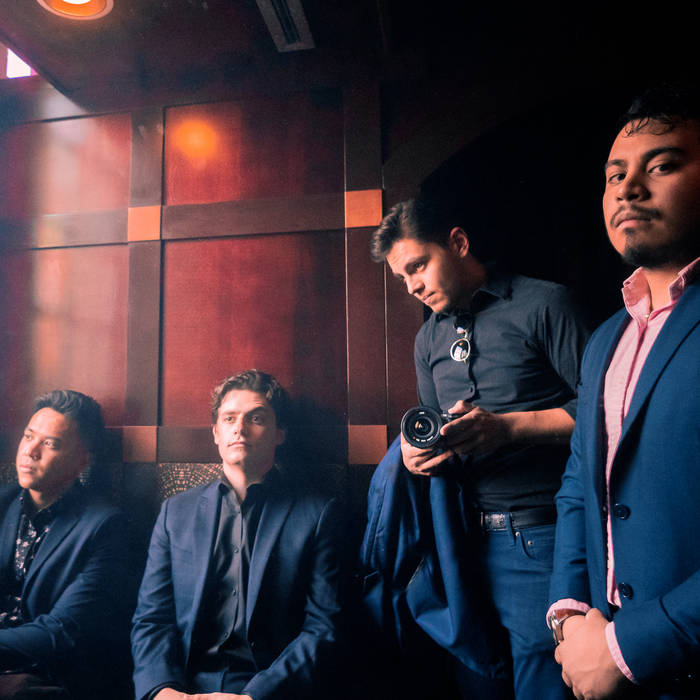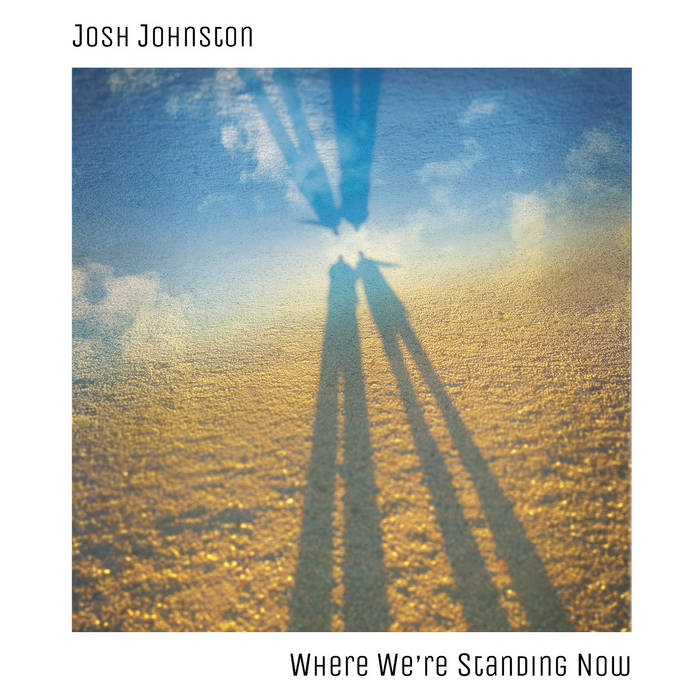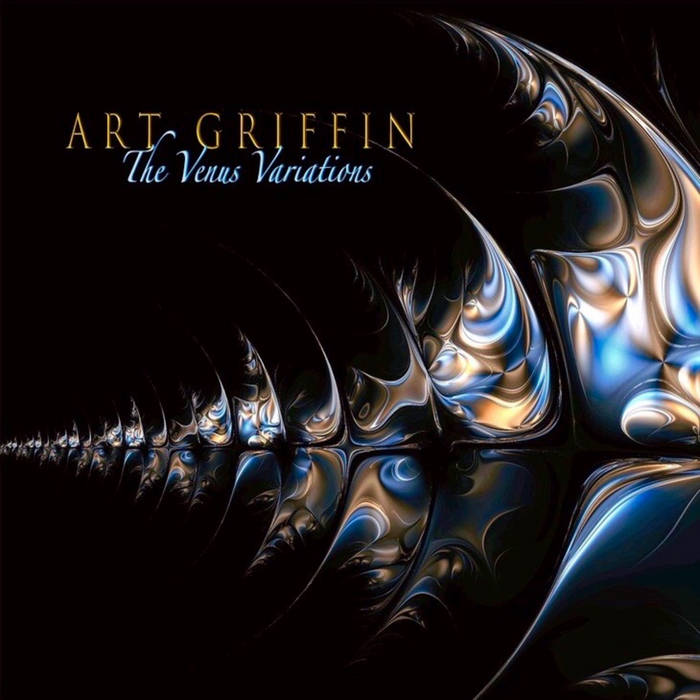|
Desert Shade is a hard-working rock band from Annapolis, Maryland that plays throughout the Baltimore area. I call their genre party rock, which sprang fully-formed in the ’70s before getting quashed by disco. You can’t hear this music without imagining a crowd of reeking revelers searching for cold beer. This band fully embodies their influences without a speck of modern daylight to break the mood. If I were looking for a contemporary band to compare, the closest would be Nebula. The DesertShade guys are not as hardcore, but display the same reverence for a lost era.
This five-song EP was recorded and mixed by the band in an Annapolis basement, pretty much as they play onstage. It’s exactly the kind of album you’d buy at the end of a live set to relive what you’ve just heard. Bobby Sacker and Nick Macleay both sing and play guitar, Anthony D. does bass and harmonica, and Nate Merrill plays drums. Lead and backing vocals are solid for the rock genre, and all the players are above average in chops and technique. “Ran Away” opens the EP with a Doobie Brothers “China Grove” riff and John Entwistle bumblebee bass. Band legend states that the original lead singer hadn’t arrived the day of a show, so the guys formed DesertShade on the spot and created this ode to bad love by some weird preordained alchemy. “All For Nothing” shifts gears into a mellow acoustic guitar and harmonica ballad. The boys were inspired by the late John Prine, but I also hear echoes of Neil Young and America. A tasty wah wah solo adds interest to this track. “Crazy Talk” was written by drummer Nate Merrill, as you can tell by the percussive heavy mix (though it gets pushed too far back as the song continues). There’s lots of slide guitar and cool dog barks during the Zeppelin-esque middle section. Though serviceable, this song was given a bit more groove space than it might deserve. “Masterplan” is one of the best tracks here. An awesome lead guitar passage leads into full-band vocals singing: “I don’t think you understand / This is all part of a master plan.” This tune is a crowd favorite and I can see why: you can’t help but sing along, and the song has a classic, dramatic build to its sweet & blue guitar solo. “Skyward” is the band’s first single and my personal favorite. Turning down from 11, the guitars play clean Eagles-like riffs leading into a John Fogarty-style vocal about living and dying and doing it all over again, “…back to where we began.” As a document capturing the live sound of this band, this EP delivers nicely. Whether this short collection stands on its own is harder to say, but fans of classic rock should not be disappointed. The band is doing a recording session 11/7 where you can pick up some vinyl. Link below.
0 Comments
Before I listened to the eponymous album Spirit of 74 by Spirit of 74 I assumed it was going to be drowning in Americana. How could an album with that title be anything other than then an amalgamation of influences from Tom Petty, John Mellencamp and countless others artists who defined the genre. My assumption was indeed correct. This is an album that drips with Americana rock from beginning to end.
The album starts with “Long Way Back” which is perhaps the most Americana infused. It contains the standard emotions of reflection and nostalgia in the spirit of “Jessie's Girl.” The production is also on point with the elements that have the textures, tones and colors that define the genre. Up next is “Telluride” which goes further in the genre with earthy tones that come from the organ and guitar. There is just enough crunch. The energy is upbeat on “Ohio” and I enjoyed the slow drip on the ballad “Lift You Up” which is a highlight in the batch and contains some gospel in the music as well. “Dark Night of the Soul,” “Mary Queen of Colombia'' and “Find You” were also well done songs. He ends with a rocker entitled “The Oncoming Storm.” I thought the songwriting was really good throughout. The songs were well structured and there were some notable books throughout. On top of that the singing was top notch. It’s dynamic and his voice works well in a number of situations. The songs were very straightforward to my ears and didn’t contain any surprises, good or bad. I felt like the songs stuck to 101 type standards that have been laid down by legends such as Tom Petty and others from around that time period. The songs never go past that but instead sort of tip their hat to the aesthetics already established. Suffice it to say I think purists of the genre will appreciate this most. Recommended.
Dead Letter is a solo project by Sean de Leon who is located in Ventura County, California. He recently released Provenience which is a ten-song album. Similar to countless other musicians, once quarantine hit he took the time to get creative.
His music is a mix of alternative, power pop, hard rock and more. Suffice it to say there are a number of sub genres under the umbrella of rock he dabbles with. This was a fairly pop oriented album in that it contains a lot of catchy, infectious melodies and tons of hooks. The music felt more ’90s oriented. In fact some of the songs had an ’80s tinge to me in a Joe Satriani type of way. The album begins with “Mind On Fire” which is a solid introduction to his sound. It starts off with a slow hum and quickly ramps up to the sound of a full rocking band. The song sounds great and polished. There is some great guitar work which reminded me of The Edge from U2. The album really starts to roll out consistently good songs from there. “Vice” is one of the songs that had more of an ’80s vibe to me. It felt like it could be a montage in a movie. The power pop infused “Untrue Believer” and “Eyes Wide Shut” are single worthy songs while “Joy” reminded me of one of my favorite groups — Fountains of Wayne. He continues to hit it out of the park with “Restless Heart” which sounded a little more contemporary in some ways. “Bad Intentions,” “Iconoclast” and “Halcyon” are also quite catchy. Last but not least is “Revenant” which opens like a huge sounding ’80s arena rock song. This was a really consistent album in terms of quality of style. I was also thinking the mood at least was pretty uplifting and fun which I actually wasn’t expecting given that it was written under quarantine. Recommended.
Isobar is a prog rock band composed of Jim Anderson (bass), Malcolm Smith (guitar) and Marc Spooner (keys). The band worked with a number of musicians who contributed instrumentation like horns and drums to their self-titled album Isobar.
Prog rock isn’t as popular as it used to be. There were some bands like Yes, King Crimson and Rush which was about as close as prog rock ever got to finding a large audience. That doesn't mean there hasn’t been an esoteric fan base since it first exploded. Suffice it to say Isobar will certainly be an album that fans of the genre will appreciate. It’s over an hour long and has thirteen songs. The album contains the staples that made it popular — 4/4 is often avoided, the songs are almost impossible to dance to and it’s about the technical aspects. This album very much sounds like an older prog rock album and I say that as a compliment. I think most fans of the genre recognize the late ’60s and early 70s as sort of the height of the genre. Those albums had a certain type of sound. The music on Isobar certainly reflects those aesthetics to my ears. This is also a dense album in terms of instrumentation. There is a lot to keep track of and I promise if you are a fan of the genre there’s so much to explore here. There is far too much music to go over in a one page review but let’s just say the band never keeps still. The songs are ever changing and in my opinion sound best with attentive listening on a high quality system. As far as the playing and delivery goes the band is top notch. The band is obviously very talented from the get go and throughout the album they flex their creative and technical skills. Prog rock has never felt like emotional music to me. It’s not something I would listen to if I wanted to feel nostalgic or provide solace to my sadness. Prog rock is musicians' music. It’s the music that inspired other people to pick up a pair of drumsticks or figure out how to write a song in 7/8 time. Isobar is prog rock at its best.
Every week we mention a couple of artists that are worth your time to check out that were not featured in our weekly reviews.
Artist Album Rating Childish Dead Again 3.6 Tobius Opalescence 3.8 Common Girl Common Girl 3.7 Mike Fuller The Human Condition 3.7 Ezekiel Sneezed Ezekiel Sneezed 3.7
Bonfire Eternal is a “quarantine” thrash metal project done by multi-instrumentalist Kerry Layne Jeffrey. As so many artists and musicians have been stuck at home for months over the past year, Jeffrey just up and decided to write and self-produce a thrash metal recording by the same name Bonfire Eternal. Layne has been playing in bands for a long time, including Hellso, The Welcome Home and Aftermind. However, he’s been out of the scene for many years, so, Bonfire Eternal is his first attempt to get back into writing and performing. The EP was recorded and mixed in Jeffrey’s home studio in Vancouver, Washington. He used various equipment in the process, one of which was a JST Rex Brown Plugin which produced the “gnarly bass tones” on "Ghouls."
This album is essentially an “exploration of fast, riff-y metal” but with some “unavoidably classic elements” influenced by the likes of Slayer, Megadeth and blended with more contemporary ideas – as in, what if Opeth covered an Every Time I Die song, while The Dillinger Escape Plan was sitting in the background, smoking a joint? Jeffrey made a deliberate choice to try and avoid a lot of what's going on in the metal scene right now when he wrote his songs. Everything he was hearing was just standard tuning (not even drop-D!). He just wanted to write straightforward, ballsy songs with cool riffs and some solos you could sing along to. Everything you hear is done by Jeffrey, except some back-up vocals on "Ritual," which were done by his wife Gwen. If you’re not into thrash metal or perhaps haven’t listened to some in a while, strap in, you’re in for a treat. “Crawling Towards the Light” is a great example of the dark, heavy sounds, and lyrics, that are sometimes associated with thrash metal music. Words like “Wasting breath / courting death / For nothing in return” and “orphans of dirt” don’t get much dark and desperate than this. Jeffrey’s guitar action is absolutely fluid and fabulous – move over Kirk Hammett! The beginning to “Lesser Blood” reminds me a little of early “speed metal” Metallica, to coin an old phrase and the double bass drumming sounds like a lineup of tanks opening fire. The bass line solos are awesome and create a balance of light and dark between the guitar parts. The lyrics suggest being into too deep into some bad crude, where it’s too late to turn back. I really liked the guitar riffs on “Ritual” - very catchy, mean and thunderous! I had to turn this one up. Lyrically, this one gets, well, real dark, and sinister – “Let me be the crux of all / Your darkest thoughts / Let me be the quiet words / To your heathen gods” and “open up hell and throw me in?” – I mean damn, take me to church I need a cleansing! Gwen’s vocal adds another dimension to this number altogether and the solo in between the heavier parts breaks up the song well. “Ghouls” is all out fast – both in the song’s length and drumming rhythm. Jeffrey’s words are a straight up “see what we’ve done? – we’ve gone and messed things up, really bad” I told you so. I sense that he may be singing about our collective negligence to fight the COVID-19 pandemic. Next is “Inherent Vice” which has a more classic feel and straightforward metal approach, both in verse to chorus structure and guitar riffs, kind of in the same vein of Megadeth. Although, Jeffrey adds more thrash towards the end. The last number is titled by the same name as his project, and compared to the other tracks, it’s his longest. Fading in, you hear tapping percussive sounds and what I’d call Edge-like echoing guitars. However, the rest of song is nowhere what U2 would put out. Lyrically, he writes some harsh universal truths about our human nature and how “everything burns” – “We’re idiot rats / who won’t flee the ship / Disbelieve that it’s going down / Pretend that it’s what we wanted / Pretend that we don’t deserve to drown.” Sometimes truths are hard to swallow. Musically, I liked Jeffrey’s double guitar work, where he lays one track onto another. I also liked his lighter moments and how he mixed in some keys in here, too. Judging from Jeffrey’s claim that he’s been out of the metal music scene, I never would have guessed. The album is tight and direct.
PrismPalace is a four-piece pop funk band from Denver, CO. The band consists of Duke Monsoon, Aaron Sanchez, Kellen Ryne Butler and Pieter Tampubolon. The four met in middle school, but it was in high school when their friendship blossomed. They decided to take their friendship into the next level by becoming a band. Divide & Conquer has reviewed their first EP Pilot back when they were known as The Waltz. The group continues to up the ante with their new EP Hoffman Heights. After taking a break to focus on their career and lives, their recent EP shows the band growing in their sound. This sense of maturity in the band, not just physically and emotionally, also shows in their music.
Hoffman Heights EP gets started with “694 Peoria St.” where the track opens up with some banter between the members of the band. The interaction seemed very natural and like another practice session between several good friends. The short intro then segues into “When I Get There” that then paves the way for some percussive beats alongside some guitar work. The vibe covers a jazzy and funk-based groove with some smooth vocals. The drum fills really ignite a driven feel to the music. The sound also contains notes of Bossa nova with inviting and ear-pleasing rhythms. I was pleasantly surprised by how accessible their sound was. Sparse guitar riffs sound off on “Next Easter.” The guitar meanders for a little while. Once the crooner-style vocals enter, the sound then moves forward to a sultrier pulse. The track mixes R&B with pop and soul to make a powerful melding that will draw more listeners closer to the PrismPalace sound. The band takes a dive into more hip hop territory with a revved rap style executed on “Bounce House.” The chorus changes things up with funk-filled vibes. As the groovy sounds adds a vibrant sense to the track, you can tell the band is having fun as they fully jam out. The EP comes full circle with more spontaneous banter between the band mates on the closer “The Afterparty,” showing more of the ease and naturalness seen in their exchanges previously in the intro. This came across as more of a faux-ending being only 39 seconds long. “Bounce House” felt more like the actual closer as the band shows audiences how to have a good time with this partying anthem. Containing “themes of heartbreak, far-fetched fantasies, partying, longing desires, crippled incomes and the overall struggles of being a young adult in today’s world,” the EP hones a contagious energy with funky bass lines, shimmering guitar work and smooth vocals that really shines with a R&B and soul groove that makes this music both so chill and fun-loving. Staunch enthusiasts to the live sector, the band throws themselves into displaying a very live element to their sound. Highly synchronized to each other’s frequencies, PrismPalace exhibits a tight-knit synergy as they anticipate one another’s antics, quirks and high jinks in five tracks that are geared to show you a rocking good ole time. Be sure you have a listen today!
Where We're Standing Now is a collection of piano solo improvisations recorded between 2013 and 2019 by Josh Johnston. In order to get away with something like this you obviously have to be very talented. On a personal note this music comes at a good time for me as I was just exploring the virtuoso Glenn Gould.
The overall vibe felt relaxing and calming for the most part. There wasn’t much dissonance or changes that you might call jarring. I don’t say this in a pejorative way but this is music that easily blends into the background. I feel like it would be good for studying or perhaps contemplative thinking. The amount of attention you provide is what you get back. Two of the songs “Green Meditation” and “Letting Go” were recorded in 2019 as part of a collaborative project with English poet Mark Hutchinson. Hutchinson read his poetry and prose and Johnston improvised to it live. Both the songs are around six minutes in length. The former in this case did feel more like the title. It’s quite serene and hypnotic. The notes sustain bleeds into each making for a beautiful soundscape There is also a fragility to the music. “Letting Go” is more syncopated. The notes are separate from each other at least at first. I enjoyed where the song went. The use of space was important to the song. “Capital City Dublin 1974-75” is larger in scope and comes in just under twenty minutes. The song is an improvised score to a short silent film of the same name shot by Jim Mulkerns and Brendan Halligan depicting Dublin city in the mid-1970s. There is a lot of nostalgia to this song. It felt tailored for a film and goes through different emotions like hope and perseverance. “Where We're Standing Now” comes in at almost forty-five minutes in length and is too epic in scale to summarize in a couple of words. I will say it’s dynamic and there are a lot of different colors and moods to explore. If you appreciated his previous material this is certainly worth your time to explore. There is an immense amount of technical and creative talent all over this release. Fans of exceptional piano players will love this. Take a listen.
The Venus Variations is a solo project by Canadian multi-instrumentalist Art Griffin with help from guitarist Kelly Kereliuk and violinist Victoria Yeh. This is the first solo album from Griffin, apart from how the trio usually records together in their prog-rock instrumental band “Art Griffin's Sound Chaser.” Far from the prog genre, The Venus Variations is a collection of styles that mix in jazz, chill and laid-back grooves. The album was written and recorded in Griffin's Artsounds Studio. Griffin also produced, mixed and mastered the recording using the latest version of Pro Tools. With Griffin on guitar, bass, keys and drum programming, Kereliuk doing the lead guitar work and Yeh on electric violin, Venus, taps into the jazzy/laid back instrumental style of the ’60s with some songs similar to George Benson and Dave Grusin. The tracks vary in style; one more Santana-like, one sounding more techno, but the overall instrumentation provides a commonality which unifies the album. Oh, and if you’re into album cover art, which was done by Mark Beatty and Jennifer Pepper – it’s quite stunning!
The beginning measures of “At Home in the Cosmos” make you believe that you are floating among the stars. It’s magical all around, and the work on electric violin by Yeh is something you don’t hear every day – it’s a pretty unique sound. Kereliuk’s guitar work intricately weaves in and out of Griffin’s drum programming, which keeps the song’s momentum going. “I Remember You from Tomorrow” starts off with a traditional piano sound on keys and more of a classical/jazz style from Kereliuk on guitar. Overall, the tune was more soulful and chill with bits of jazzier breaks in between the main melody. Next up is “Worlds of Wonder” – an ethereal journey with rich, echoing textures and imaginative sounds. About mid-way through there is a subtle key change and some drums drop in. This one definitely has a “laid back” feel to it. “They Walk Among Us” is by far the longest song on the album and it enfolds with interesting twists and turns as if you’re reading a good story. It starts off with spacious keyboard work, and then a ‘60s/’70s-art-prog jazz style, but as mentioned before, kind of like George Benson, but less smooth and soulful. Overall, it grooves along well with the drum programming and bass lines keeping time. Yeh’s electric violin adds another dimension, almost at times sounding like a synthesizer. Moving along to “Venus Variations No. 1” is a tune that taps into a celestial, soundscape vibe, something like what you might hear on the radio show Hearts of Space. The balance between the percussive work and keys done by Griffin and electronic violin by Yeh is lively and bold, not to mention very science fiction-like. I enjoyed this one a lot. “Everywhen” gets heavy on the keys, in a ‘70s soul Benson kind of way. Kereliuk’s work on guitar is awesome, as she adds some heavy distortion into the mix. This one had a sultry appeal, but also, the drumming brings a lighter jazz feel with most of the rhythm done on the ride cymbal. Next is “Jovian Raindance” which begins a little like 10CC’s “I’m Not in Love” but when the drums come in, with their very Latin style rhythm, I thought of Santana. Kereliuk’s work on guitar is some of her best on this album. This is a very exciting track, danceable for sure and one I would listen to, that is if you’re into this band’s style of work. The last tune is “Starliner” which has a very unique composition – it almost sounds like the keys, guitar, drums and bass are all playing their own rhythm. Very complex and perhaps the band’s most creative “thinking outside the box” song. Need something new and interesting to listen to? I’d recommend The Venus Variations by Art Griffin.
Dylan Kloska is an artist from Chicago who recently released Country Time. There are four songs all of which are under three minutes. The recording quality is noticeably different on each one of these tracks. That being said the songs are all very similar which consists of strummed guitar chords and vocals.
The first song is entitled “Funny” which is a straightforward folk song. Kloska strums a couple of minor and major chords and there is some occasional lead guitar that is in the song as well. The vocals contain one prominent melody that repeats and there is no bridge, chorus or an outro to the song. It stopped a bit unexpectedly and came in just over a minute. It felt like an intro. Up next is “July” which again consists of strummed major and minor chords but this time there is a phaser effect which you could argue was a little too intense. The mood is sort of the bread and butter archetype of the tortured singer/songwriter that whispers universal truths into your ear like “you can be love/you can be happiness.” That being said there aren’t many lyrics. Some of the song is simply strummed chords and the phaser effect with another lead over it. This is a song that seemed like a big chorus or hook was coming but it actually doesn't. The song goes into just instrumental again and the phaser effect takes over the song. I liked it quite a bit and kept me on my toes. “From, A Simpler Love In Time'' is another simple folk song that contains strummed major and minor chords. It’s got an older bohemian folk style similar to the countless artists that came out of the scene in the late ’60s that were influenced by Bob Dylan. It felt like the highlight to my ear and I really liked the outro. “Come And Look At My Place Now” is similar to “From, A Simpler Love In Time” in both tone and mood. The song is very lo-fi which works here. There is some reverb-like rumbling effect that works well in the song. I liked the mood and emotion on the release. Musically, I wish there was a little more to grab onto especially technically speaking. Perhaps some guitar picking, dissonance or augmented 13th chords. Just something that felt a little experimental or off-kilter. Overall, I thought this was a solid batch of straightforward folk songs. His lyrics and vocals were consistently impressive. I look forward to hearing where he goes from here. |
Critique/insightWe are dedicated to informing the public about the different types of independent music that is available for your listening pleasure as well as giving the artist a professional critique from a seasoned music geek. We critique a wide variety of niche genres like experimental, IDM, electronic, ambient, shoegaze and much more.
Are you one of our faithful visitors who enjoys our website? Like us on Facebook
Archives
July 2024
|

